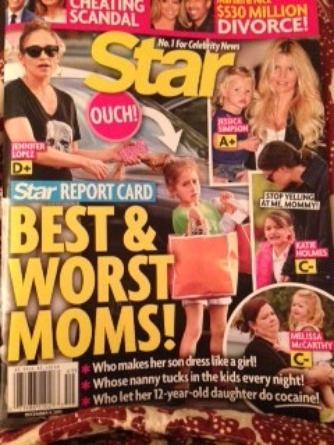Mothers to Star Magazine: Fu*k Off!
I used to think our national sport was football. Then I had children. And learned very quickly that in fact, our national sport is judging mothers. It starts early in the process. From the moment I conceived, it seemed, everybody had an opinion about what I ate, what I wore, what I should do. Much of it was well-intentioned--advice about how to handle morning sickness was something I really appreciated. I did NOT appreciate being told by one woman that "I was always too busy to have morning sickness." Nor did I appreciate child birth educators telling me that having an epidural would make me a bad mother.
The judgment of mothers is interpersonal, but it is also institutional. I'll never forgot the gadget a friend bought and hooked to her baby bump. The syncopated rhythms it played were supposedly the building blocks of language. For $300, this piece of junk (that was later debunked as nothing better than a piece of plastic that played syncopated rhythms), the company told us, would make us better mothers.
Once the baby was out, forget it. Put a hat on him. He's hot. He's cold. You should carry him in a sling, it's better for him! You shouldn't carry him in a sling! He's uncomfortable. Blah blah blah.
I basically tried to give people the benefit of the doubt. We evolved as cooperative breeders, after all, raising our children with the help of kin and the kindly disposed. So it only made sense, I figured, that as a species we have strong opinions about how others should take care of their kids. The nagging and telling me what t o do, I reasoned, was residual "It Takes a Village" stuff.
But it only got more intense when my kids were toddlers. There were so many places I couldn't bring them. Children were to be sequestered at home, in play groups, and later at school. In other cultures, kids are just there, part of the fabric of every day life. But I got dirty looks for bringing my kid to a cafe. No surprise, I suppose, from the society that brought you the tradition of women nursing their babies in the filthiest imaginable place, public restrooms, so no one would be "offended" by babies eating. As the anthropologist Meredith Smalls has observed, in many ways we live in a very anti-child culture.
For a culture that prefers that we sequester our kids away and encourages us to institutionalize them in schools at age two, we sure have a lot to say about mothers and kids in public. Exhibit A: The newest issue of Star Magazine, its annual "Best and Worst Moms Report Card."
Here's what makes Jessica Simpson a "good mother" who earns an "A": "She changes their diapers and dotes on her kids. She strains vegetables and chops up bananas and even makes applesauce for her kids."
Melissa McCarthy, on the other hand, gets a "C-" And guess why? Owing to her "busy movie career she has little time for her two daughters," an 'insider' explains. "When she is actually home she's busy memorizing lines or on the phone for business."
What? She's trying to balance work and life, rather than strain vegetables? Call Child Protective Services! Oh, and could that "insider" be a disgruntled nanny or housekeeper, perchance? Some other possible scenarios: Maybe Suri Cruise is crying in those photos because she's surrounded by paparazzi angling to shoot her for a price, not because her mom sucks? Maybe Gwyneth Paltrow made a bad move on a Vespa trying to get away from photographers and reporters who created the circumstances under which they could later judge her for being a bad mother? Maybe Selma Blair's two year old is having a tantrum because he is two years old, and two year olds have tantrums, not because his mom is a diva?
Sure, there are mothers who smoke while they're pregnant. There are dads who do drugs. There's all manner of bad parenting out there. But what's just as disturbing is our fascination with celebs who are good and bad mothers, and our fixation as a culture on how women can mother better, our never- ending drumbeat telling them what to do, and our conviction that we know what's best. F*ck off, Star.
